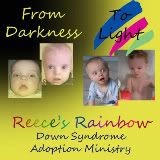
Although I was extremely happy to see baby Trig's picture on the front of US Weekly, I cringed at the caption "Pallin and newborn Trig afflicted with Down syndrome"
People “have” Down syndrome, they do not “suffer from” it and are not “afflicted by” it.
Below are tips for the proper use of language for ‘Down syndrome’. The National Down Syndrome Society and the National Down Syndrome Congress has encouraged all media to use the below language:
Down vs. Down’s. NDSS and NDSC use the preferred spelling, Down syndrome, rather than Down’s syndrome. While Down syndrome is listed in many dictionaries with both popular spellings (with or without an apostrophe s), the preferred usage in the United States is Down syndrome. This is because an “apostrophe s” connotes ownership or possession. Down syndrome is named for the English physician John Langdon Down, who characterized the condition, but did not have it. The AP Stylebook recommends using “Down syndrome” as well.
People with Down syndrome should always be referred to as people first. Instead of “a Down syndrome child,” it should be “a child with Down syndrome.” Also avoid “Down’s child” and describing the condition as “Down’s,” as in, “He has Down’s.”
It is clinically acceptable to say “mental retardation,” but you may want to use the more socially acceptable “cognitive disability” or “cognitive impairment.”
Down syndrome is a condition or a syndrome, not a disease.







































No comments:
Post a Comment